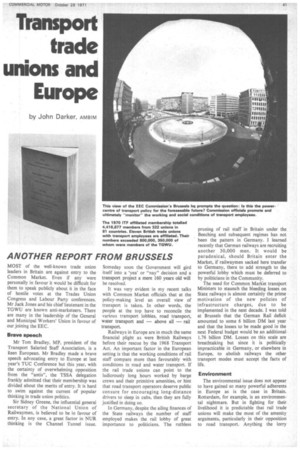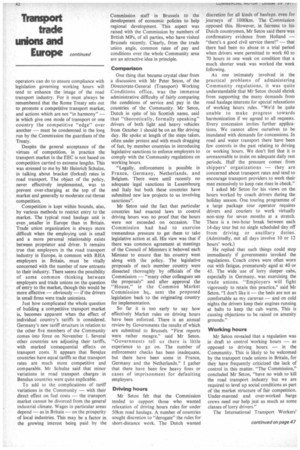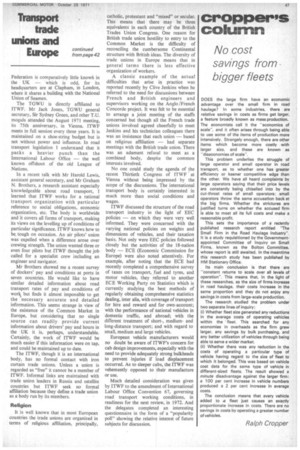Transport trade unions and Europe
Page 83

Page 84

Page 89

If you've noticed an error in this article please click here to report it so we can fix it.
by John Darker, AMBIM
ANOTHER REPORT FROM BRUSSELS
MOST of the well-known trade union leaders in Britain are against entry to the Common Market. Even if any were personally in favour it would be difficult for them to speak publicly about it in the face of hostile votes at the Trades Union Congress and Labour Party conferences. Mr Jack Jones and his chief lieutenant in the TGWU are known anti-marketeers. There are many in the leadership of the General and Municipal Workers' Union in favour of our joining the EEC.
Brave speech
Mr Tom Bradley, MP, president of the Transport Salaried Staff Association, is a keen European. Mr Bradley made a brave speech advocating entry to Europe at last year's TUC Conference but this year, with the certainty of overwhelming opposition from the "antis", the TSSA delegation frankly admitted that their membership was divided about the merits of entry. It is hard to swim against the current of popular thinking in trade union politics.
Sir Sidney Greene, the influential general secretary of the National Union of Railwaymen, is believed to be in favour of entry. In any case, a great factor in NUR thinking is the Channel Tunnel issue. Someday soon the Government will gird itself into a 'yea' or "nay" decision and a transport project a mere 160 years old will be resolved.
It was very evident in my recent talks with Common Market officials that at the policy-making level an overall view of transport is taken. In other words, the people at the top have to reconcile the various transport lobbies, road transport, water transport and — above all — rail transport.
Railways in Europe are in much the same financial plight as were British Railways before their rescue by the 1968 Transport Act. An important factor in the European setting is that the working conditions of rail staff compare more than favourably with conditions in road and water transport. If the rail trade unions can point to the ludicrously long hours worked by barge crews and their primitive amenities, or hint that road transport operators deserve public censure for encouraging long-distance drivers to sleep in cabs, then they are fully justified in doing so.
In Germany, despite the ailing finances of the State railways the number of staff employed makes the rail lobby of great importance to politicians. The ruthless pruning of rail staff in Britain under the Beeching and subsequent regimes has not been the pattern in Germany. I learned recently that German railways are recruiting another 30,000 men. It would be paradoxical, should Britain enter the Market, if railwaymen sacked here transfer to Germany, there to add strength to the powerful lobby which must be deferred to by politicians in the Community.
The need for Common Market transport Ministers to staunch the bleeding losses on State railways is almost certainly the prime motivation of the new policies of infrastructure charges, due to be implemented in the next decade. I was told at Brussels that the German Rail deficit amounted to some 6 billion DM last year and that the losses to be made good in the next Federal budget would be an additional 1.76 billion DM. Losses on this scale are breathtaking but since it is politically impracticable in Germany, or elsewhere in Europe, to abolish railways the other transport modes must accept the facts of life.
Environment
The environmental issue does not appear to have gained so many powerful adherents in Europe as is the case in Britain. Rotterdam, for example, is an environmental nightmare. But in fighting for their livelihood it is predictable that rail trade unions will make the most of the amenity arguments, particularly in their opposition to road transport. Anything the lorry operators can do to ensure compliance with legislation governing working hours will tend to enhance the image of the road transport industry. For it must always be remembered that the Rome Treaty sets out to promote a competitive transport market, and actions which are not "in harmony" — ie which give one mode of transport or one country the competitive "edge" over another — must be condemned in the long run by the Commission the guardians of the Treaty.
Despite the general acceptance of the virtues of competition, in practice the transport market in the EEC is not based on competition carried to extreme lengths. This was stressed to me by Mr Heinrich Schulze, in talking about bracket (forked) rates in road transport. The object of the policy, never effectively implemented, was to prevent over-charging at the top of the market and generally to moderate cut-throat competition.
Competition is kept within bounds, also, by various methods to restrict entry to the market. The typical road haulage unit is even smaller in Europe than in Britain. Trade union organization is always more difficult when the employing unit is small and a more personal relationship exists between proprietor and driver. It remains true that employers in the road transport industry in Europe, in common with RHA employers in Britain, must be vitally concerned with the number of new entrants to their industry. There seems the possibility of some common thinking between employers and trade unions on the question of entry to the market, though this would be more effective — obviously — if the drivers in small firms were trade unionists.
Just how complicated the whole question of building a competitive transport market is, becomes apparent when the effect of
individual country's tariffs is considered. Germany's new tariff structure in relation to
the other five members of the Community comes into force on November 1. Several other countries are adjusting their tariffs, with marked consequential effects on transport costs. It appears that Benelux countries have equal tariffs so that transport rates are much more competitive and comparable. Mr Schulze said that minor variations in road transport charges in Benelux countries were quite explicable.
To add to the complications of tariff variations in the Community — with their direct effect on fuel costs — the transport market cannot be divorced from the general industrial climate. Wages in particular areas depend — as in Britain — on the prosperity of local industries. This may be a factor in the growing interest being paid by the Commission staff in Brussels to the development of economic policies to help regional development. This aspect was raised with the Commission by numbers of British MPs, of all parties, who have visited Brussels recently. Clearly, from the trade union angle, common rates of pay and conditions over the whole Community area are an attractive idea in principle.
Comparison
One thing that became crystal clear from a discussion with Mr Peter Seton, of the Directorate-General (Transport) Working Conditions office, was the immense administrative difficulty of fairly comparing the conditions of service and pay in the countries of the Community. Mr Seton, Dutch in spite of his Scottish name, said that "theoretically, formally speaking" drivers of both light and heavy vehicles from October 1 should be on an 8hr driving day. He spoke at length of the steps taken, often under protest and with much dragging of feet, by member countries in introducing legislative sanctions to enforce employers to comply with the Community regulations on working hours.
"Legally, enforcement is possible in France, Germany, Netherlands, and Belgium. There were until recently no adequate legal sanctions in Luxembourg and Italy but both these countries have submitted new law projects to us involving sanctions".
Mr Seton said the fact that particular countries had enacted laws to control driving hours was no proof that the hours were not exceeded on occasion. The Commission had had to exercise tremendous pressure to get them to take legislative action at all. His view was that if there was common agreement at meetings of the Council of Ministers it behoved each Minister to ensure that his country went along with the policy. The legislative proposals of each member country were dissected thoroughly by officials of the Commission — "many other colleagues see the proposals" and after approval the "House," ie the Common Market Commission hq, sent the proposed legislation back to the originating country for implementation.
So far it is too early to say how effectively Market rules on driving hours have been enforced. There is an annual review by Governments the results of which are submitted to Brussels. "First reports were rather meagre," said Mr Seton. "Governments tell us there is little experience to go on. The number of enforcement checks has been inadequate, but there have been some in France, Germany and the Netherlands." I gather that there have been few heavy fines or cases of imprisonment for defaulting employers.
Driving hours
Mr Seton felt that the Commission tended to support those who wanted relaxation of driving hours rules for under 50km road haulage. A number of countries sought discretion to "derogate" the rules for short-distance work. The Dutch wanted discretion for all kinds of haulage. even for journeys of 1000km. The Commission opposed this. However, in fairness to his Dutch countrymen, Mr Seton said there was confirmatory evidence from Holland — "there's a good civil service there!" — that there had been no abuse in a trial period when drivers were permitted to work 60 to 70 hours in one week on condition that a much shorter week was worked the week following.
As one intimately involved in the practical problems of administering Community regulations, it was quite understandable that Mr Seton should shrink from supporting the many demands from road haulage interests for special relaxations of working hours rules. "We'd be quite unable to make progress towards harmonization if we agreed to all requests. Every concession invites further applications. We cannot allow ourselves to be inundated with demands for concessions. In road and water transport there have been few controls in the past relating to driving or working hours. We don't feel that it is unreasonable to insist on adequate daily rest periods. Half the pressure comes from shippers' organizations — they are concerned about transport rates and tend to encourage transport providers to work their men excessively to keep rate rises in check."
I asked Mr. Seton for his views on the hours worked by coach drivers during the holiday season. One touring programme of a large package tour operator requires drivers and couriers to work virtually non-stop for seven months at a stretch. There is a two-hour break between each 14-day tour but no single scheduled day off from driving or ancillary duties. (Admittedly, not all days involve 10 or 12 hours' work.)
He replied that such things could stop immediately if governments invoked the regulations. Coach crews were often worn out with fatigue, prematurely aged at 40 or 45. The wide use of lorry sleeper cabs, especially in Germany, was exercising the trade unions. "Employers will fight vigorously to retain this practice," said Mr Seton. "I don't like it — the beds are not as comfortable as my caravan — and on cold nights the drivers keep their engines running at halts to keep the cab warm. This is causing objections to be raised on amenity grounds."
Working hours Mr Seton revealed that a regulation was in draft to control 'working hours — as opposed to driving hours, — in the Community. This is likely to be welcomed by the transport trade unions in Britain, for they have frequently criticized the lack of control in this matter. "The Commission," concluded Mr Seton, "have no wish to kill the road transport industry but we are required to level up social conditions as part of the market structure of fair competition. Under-manned and over-worked barge crews need our help just as much as some classes of lorry drivers."
The International Transport Workers' Federation is comparatively little known in the UK — which is odd. for its headquarters are at Clapham, in London, where it shares a building with the National Union of Seamen.
The TGWU is directly affiliated to ITWF. Mr Jack Jones, TGWU general secretary, Sir Sydney Green, and other T.U. moguls attended the August 1971 meeting, its 75th anniversary, in Vienna. ITWF meets in full session every three years. It is maintained on a shoe-string budget but is not without power and influence. In road transport legislation I understand that it packs a heavier punch than the International Labour Office — the well known offshoot of the old League of Nations.
In a recent talk with Mr Harold Lewis. assistant general secretary, and Mr Graham N. Brothers, a research assistant especially knowledgeable about road transport. I learned that ITWF works for a rational transport organization with particular reference to social obligations, economic organization, etc. The body is worldwide and it covers all forms of transport, making its views on the levelling up of conditions of particular significance. ITWF knows how to be tough on occasion. An air pilots' union was expelled when a difference arose over crewing strength. The union wanted three or even four pilots but ITWF thought the job called for a specialist crew including an engineer and navigator.
Mr Brothers showed me a recent survey of dockers' pay and conditions at ports in seven countries. He would like to have similar detailed information about road transport rates of pay and conditions of work4 but finds it almost impossible to get the necessary accurate and detailed information. This seems strange in view of the existence of the Common Market in Europe, but considering that no single source can readily provide current information about drivers' pay and hours in the UK it is, perhaps, understandable. Certainly, the work of ITWF would be much easier if this information were on tap, and could be maintained up to date.
The ITWF, though it is an international body. has no formal contact with iron curtain trade unions. Unless a union is regarded as "free" it cannot be a member of ITWF. Informal links are maintained with trade union leaders in Russia and satellite countries but ITWF seek no formal affiliation because they define a trade union as a body run by its members.
Religion
It is well known that in most European countries the trade unions are organized in terms of religious affiliation, principally,
catholic, protestant and "mixed" or secular. This means that there may be three equivalents in each country of the British Trades Union Congress. One reason for British trade union hostility to entry to the Common Market is the difficulty of reconciling the cumbersome Continental structure with British ideas. The diversity of trade unions in Europe means that in general terms there is less effective organization of workers.
A classic example of the actual difficulties that arise in practice was reported recently by Clive Jenkins when he referred to the need for discussions between French and British engineers and supervisors working on the Anglo/French Concorde project. It was felt to be essential to arrange a joint meeting of the staffs concerned but though all the French trade unions involved agreed cheerfully to meet Jenkins and his technician colleagues there was an insistence that each union — based on religious affiliation — had separate meetings with the British trade union. There was an adamant refusal to meet as a combined body, despite the common interests involved.
No one could study the agenda of the recent Thirtieth Congress of ITWF at Vienna without being impressed by the scope of the discussions. The international transport body is certainly interested in much more than social conditions and wages.
ITWF discussed the structure of the road transport industry in the light of EEC policies — on which they were very well informed. They were concerned with the varying national policies on weights and dimensions of vehicles, and their taxation basis. Not only were EEC policies followed closely but the activities of the 18-nation body — ECE (Economic Commission for Europe) were also noted attentively. For example, after noting that the ECE had recently completed a comprehensive survey of taxes on transport, fuel and tyres. and motor vehicles, they referred to another ECE Working Party on Statistics which is currently studying the best methods of regularly obtaining comprehensive statistics dealing, inter alia. with coverage of transport for hire and reward and for own-account; with the performance of national vehicles in domestic traffic, and abroad; with the different treatment of short-, mediumand long-distance transport: and with regard to small, medium and large vehicles.
European vehicle manufacturers would no doubt be aware of ITWF's concern for cab design improvements, especially with the need to provide adequately strong bulkheads to prevent injuries if load displacement occurred. As to sleeper cabs, the ITWF was vehemently opposed to their manufacture or use.
Much detailed consideration was given by ITWF to the amendment of International Labour Office Convention 67, governing road transport working conditions, in readiness for the next review, in 1972. And the delegates completed an interesting questionnaire in the form of a "popularity poll" showing the relative interest of future subjects for discussion.












































































































































